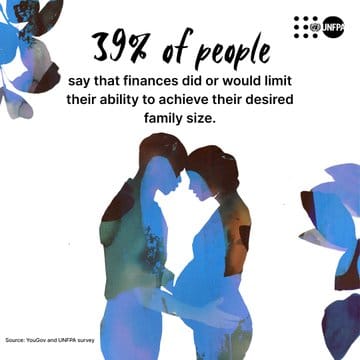Last Updated on June 16, 2025 1:49 am by INDIAN AWAAZ
Millions of people around the world are unable to have the number of children they want – whether they want more, fewer, or none at all.
by Andalib Akhter
In a world grappling with falling birth rates and ageing populations, a new UN report turns the spotlight away from personal choice and onto deeper societal failures. Contrary to popular belief, today’s young people aren’t rejecting parenthood—they’re being denied the chance to become parents by rising economic hardship, worsening job insecurity, gender imbalances, and growing anxiety about the planet’s future.
Released on June 10 by the UN Population Fund (UNFPA), the State of World Population 2025 report challenges widespread assumptions about falling fertility. Titled “The Real Fertility Crisis: The Pursuit of Reproductive Agency in a Changing World”, the report highlights that the true crisis lies not in people’s preferences, but in their limited ability to act on them.
Based on a sweeping UNFPA–YouGov survey conducted across 14 countries—home to over a third of the world’s population—the findings paint a stark picture. Nearly four in ten respondents said they were having fewer children than they wanted due to financial constraints. Rising living costs, unaffordable housing, childcare expenses, and job insecurity are pushing family dreams further out of reach.
But money is only part of the equation. Roughly one in five surveyed cited fears about the future—ranging from the climate crisis to geopolitical instability—as major reasons for delaying or forgoing children. These existential anxieties, the report argues, are reshaping reproductive choices across the globe.
Gender inequality also emerged as a powerful and persistent barrier. Many women reported that the unequal burden of domestic work, lack of workplace support for parenting, and enduring societal expectations made it difficult to consider having children. In contrast, men were less likely to cite these issues, revealing an ongoing gender divide in both responsibility and perception.
Disturbingly, the data also exposes a disconnect between reproductive intention and reality. One in three adults reported experiencing an unintended pregnancy, while one in four felt they could not have a child when they wanted. Meanwhile, one in five said they had been pressured into parenthood against their will—an alarming indicator of compromised reproductive autonomy.
- “I want children, but it’s becoming more difficult as time passes by. It is impossible to buy or have affordable rent in my city. I also would not like to give birth to a child in war times and worsened planetary conditions, if that means the baby would suffer because of it.”Anonymous
Female, 29, Mexico
As countries across the world grapple with declining birth rates and ageing populations, many have turned to quick fixes—offering baby bonuses, cash incentives, or setting national fertility targets. However, the UNFPA warns that such approaches are not only ineffective but risk infringing on basic human rights by pressuring people into reproductive decisions.
Instead, the report calls for a more humane, thoughtful response rooted in choice and dignity. Governments are urged to dismantle the barriers to parenthood by investing in affordable housing, stable employment, paid parental leave, and accessible, high-quality reproductive healthcare. These structural supports, the agency argues, would enable people to make free and informed decisions about starting or growing their families.
Another key recommendation is to reframe immigration as a solution rather than a problem. With shrinking workforces and rising dependency ratios, countries should see migrants not as a burden, but as vital contributors to economic and demographic sustainability.
On the issue of gender, the UNFPA advocates for cultural and institutional reforms that support both mothers and fathers. This includes promoting paternity leave, dismantling workplace norms that punish caregiving, expanding access to contraception, and confronting outdated stereotypes that still shape relationships and parenting roles.
Ultimately, the State of World Population 2025 urges policymakers to listen to what people actually want—not to impose reproductive goals on them, but to create conditions where choice, not compromise, defines the path to parenthood.
As the world faces rising uncertainty, one truth rings clear: the fertility crisis is not about disinterest in children. It’s about a generation’s struggle to find the space, stability, and support to bring the families they dream of into reality.

